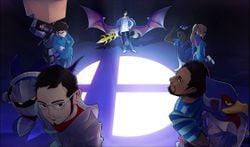Smash 3
| Smash 3 | |
|---|---|

| |
| Projected release date | 2018 |
| Runtime | TBA |
| Language(s) | English |
| Budget | $9,290 |
| Crew | |
| Director(s) | Corey Shin |
| Music by | Stephen Walking |
Smash 3 is an upcoming Super Smash Bros. Brawl and early Super Smash Bros. 4 documentary produced by False that was kickstarted in February 2016[1]. The Kickstarter grew to $9,290 at a goal of $6,303. The documentary is Brawl's and SSB4's answer to The Smash Brothers, and will cover the main chronology follows the happenings between Apex World Championship events and profiles each year's grand champion, among other influential figures.
Planned Episodes
- "The First King" (2008) - release of Brawl, reign of Mew2King, rise of Meta Knight. Mew2King on a consistent rampage, winning everything
- "The Northern Assassin" (2009) - Ally's revenge, a new champion, birth of Apex. Ally overthrows Mew2King at multiple majors. The rise of many start here.
- "The Farmer in the East and the Boxer of the West" (2010) - international invasion (Japan), glimpse of eSports (MLG). Japan redefines the game's limits, DEHF (Larry Lurr) redefines the game.
- "Blips" (2011) - vicegrip of Meta Knight, first major period of attendance drops, vague confirmation of Smash 4 at E3. Brawl tournament entries begin losing steam
- "Clear" (2012) - Japan's revenge, appearance of Europe, fire lit under everyone's asses, MK preserved, splits in community. Japanese and European players show the complacent US what's up.
- "New Hope" (2013) - Salem rocks everyone's world, brief revival, attendance shrinks down to its most dedicated players. Smash 4 at E3, remotivation. Melee at EVO/#oneunit. A dark horse takes Apex by storm, Smash is thrust into a new, greater spotlight.
- Untitled episode (2014) - Brawl not present at MLG comeback or EVO, #freessbb, forsaking of #oneunit, attempts to revive game in last days, E3 invitational, game shown to be like Brawl, community split continues, Smash 4 release/gradual transfer.
Development
The project was published on Kickstarter on February 9th, 2016 with a goal of raising $6,303. The goal would be reached only 9 days later. Funding for the project ended on March 10th, 2016. The project ended up earning $9,290 from 337 backers. Following the successful funding of the project, False began recording major tournaments and interviewing players.[2] By late May of 2017, False had accumulated nearly one terabyte of footage for the documentary. Despite this, a lot of footage and many interviews were still needed. Acquiring an interview with Otori was notably a big obstacle in development due to there existing a large language barrier and Otori not being present within the community recently. Editing on the documentary began in June or July 2017. Prior to beginning the editing process, False contacted Samox, the director and producer of The Smash Brothers for help and insight on how to organize footage. A program named Scrivener was used to help organize footage. Around the same time as contacting Samox, False managed to find and work with a narrator for the documentary. During this time, False also began working with Stephen Walking on composing the soundtrack for the documentary.[3] A trailer was released to backers of the kickstarter on April 10th, 2018.[4]
Controversy
After raising around $10,000 for the Brawl documentary, false's updates on the project became increasingly sparse, and he has been known to ignore almost all inquiries about the subject. After being pressured repeatedly following assault allegations [5] , false finally revealed a large backlog of footage and some of his editing process, although the actual extent to which he has worked is unknown. [citation needed]
An anonymous Twitter burner account known as "Error: 102-R" claims in a Twitlonger post that after his organization, team ZENMA, disbanded due to the aforementioned assault controversy, false simply ran away with the money he had left. According to Error, false needed the editing skills of those in the organization to complete production, and did not intend on finishing the documentary after all of his possible collaborators had left.[6]